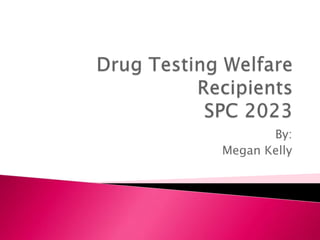
Drug testing powerpoint
- 2. Doesn’t it make you angry to think about the simple fact that people in some states do not need drug tested before receiving FREE money, but yet some people need drug tested to work
- 4. Florida's law was halted by a district judge. In February 2013, the 11th Circuit Court of Appeals upheld the lower court's ruling to halt enforcement of the program. In 2009, over 20 states proposed legislation that would require drug testing as a condition of eligibility for public assistance programs. In 2010 at least 12 states had similar proposals. Three states passed legislation in 2011, four states enacted laws in 2012, and one state has passed legislation in 2013, bringing the total number of states to eight.
- 5. Positive life changes Distribute money to people that need it
- 6. Welfare will simply be used for the correct purpose. DRUG TEST recipents Document, look for trends
- 7. Although almost 20 percent of welfare recipients report recent use of some illicit drug during the year, only a small minority satisfy criteria for drug or alcohol dependence, as indicated by the short-form Composite International Diagnostic Interview. Illicit drug use and dependence and alcohol dependence are more common among women receiving welfare than among women who do not. For mothers who used cocaine, 59 percent received AFDC/TANF for at least 5 years and 75 percent experienced some period of welfare receipt. Drug use is a risk factor for welfare receipt
- 8. If the goal of welfare is to promote self-sufficiency, the most basic first step, state lawmakers have argued, is stopping drug use that hampers their entry into the job market!!
Notas do Editor
- I know this topic fires me up because I work overtime weekly to pay for all of my things and some people get handed money to pay for their bad addictions.
- As of April 17, 2013, at least 29 states have future legislation requiring some form of drug testing or screening for public assistance recipients in 2013. At least eight states have passed legislation regarding drug testing or screening for public assistance applicants or recipients. These states include: Arizona, Florida, Georgia, Kansas, Missouri, Oklahoma, Tennessee and Utah. Some apply to all applicants; others contain specific language that there is a reason to believe the person is engaging in illegal drug activity or has a substance use disorder; others require a specific screening process. At least 29 states have introduced legislative proposals requiring drug testing or screening for public assistance applicants or recipients in 2013. One state, Kansas, approved legislation to entail drug testing when sensible suspicion exists that the applicant or beneficiary is using forbidden substances.”
- According to The Foundry and National Conference of State Legislatures.
- A 2007 study by the Robert Wood Johnson Foundation discovered that 20 percent of TANF recipients self-report using illegal drugs—likely an undercount, according to the researchers. Five percent report drug abuse or dependence, and 6.5 percent report alcohol abuse. 1. Drug testing will make people think twice about using illegal substances 2. This will possibly lower the use of illegal substances 3. Which will then make for a better home environment and environment for the person himself/herself. 4. If the government requires monthly testing this will keep all recipients of welfare clean.
- Lets start by giving money to people that are truly in need!!If the government requires people to be drug tested then the people who test negative for illegal substances will be granted welfare, those that test negative will not.There are many people in this world that do not receive welfare for many reasons, not including drug addiction. Giving welfare to people who use it incorrectly, takes away from those that really need it and would use it correctly.The government can look for trends that families may be having, for example continuing to have children so they receive more and more welfare money.
- Too many people use their free welfare money for the wrong reasons.States and the federal government should enlarge drug screening for programs providing taxpayer welfare support.The most concerned policy will make incentives to stop critical behavior instead of allowing tax dollars to fuel it, promoting the basic responsibility needed for potential employment
- Although some people feel that drug testing should not be required for welfare, many people feel the opposite. If someone has nothing to hide then why not just proceed with the drug test willingly. Working in and around the law enforcement I see way too many cases that deal with drugs and addiction. Some people may argue that even though they do illegal substances, their welfare money is going to food, shelter, and ECT; but in the end if someone has enough money to pay for marijuana, crack, cocaine, heroin, and many more then you have enough money to pay for food or a roof over your head. Some people just simply need to learn how to budget their money and make the right decisions. Even though not all states in the United States require drug testing for welfare, it is an ongoing battle and hopefully in the next decade all states will require it.